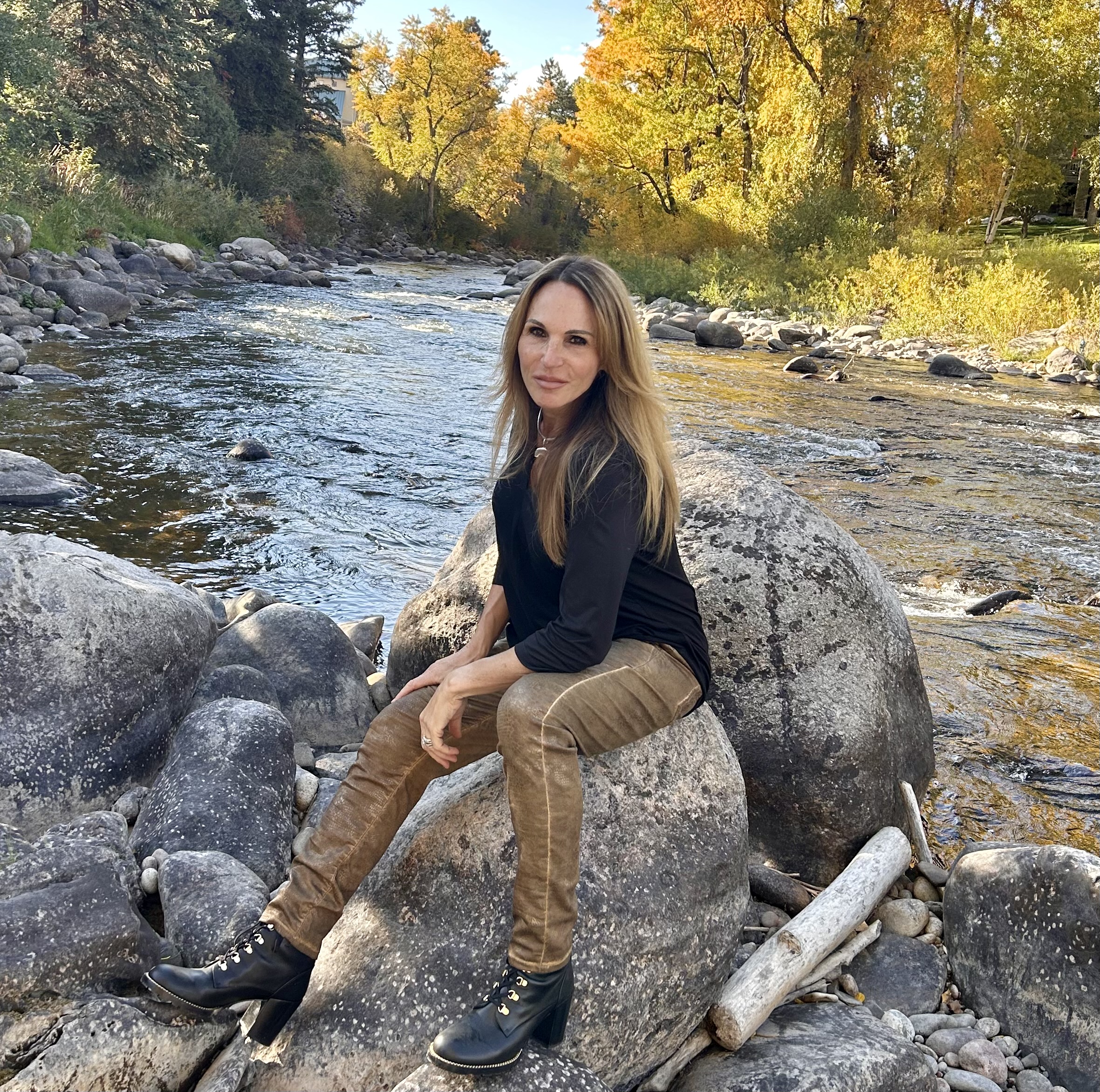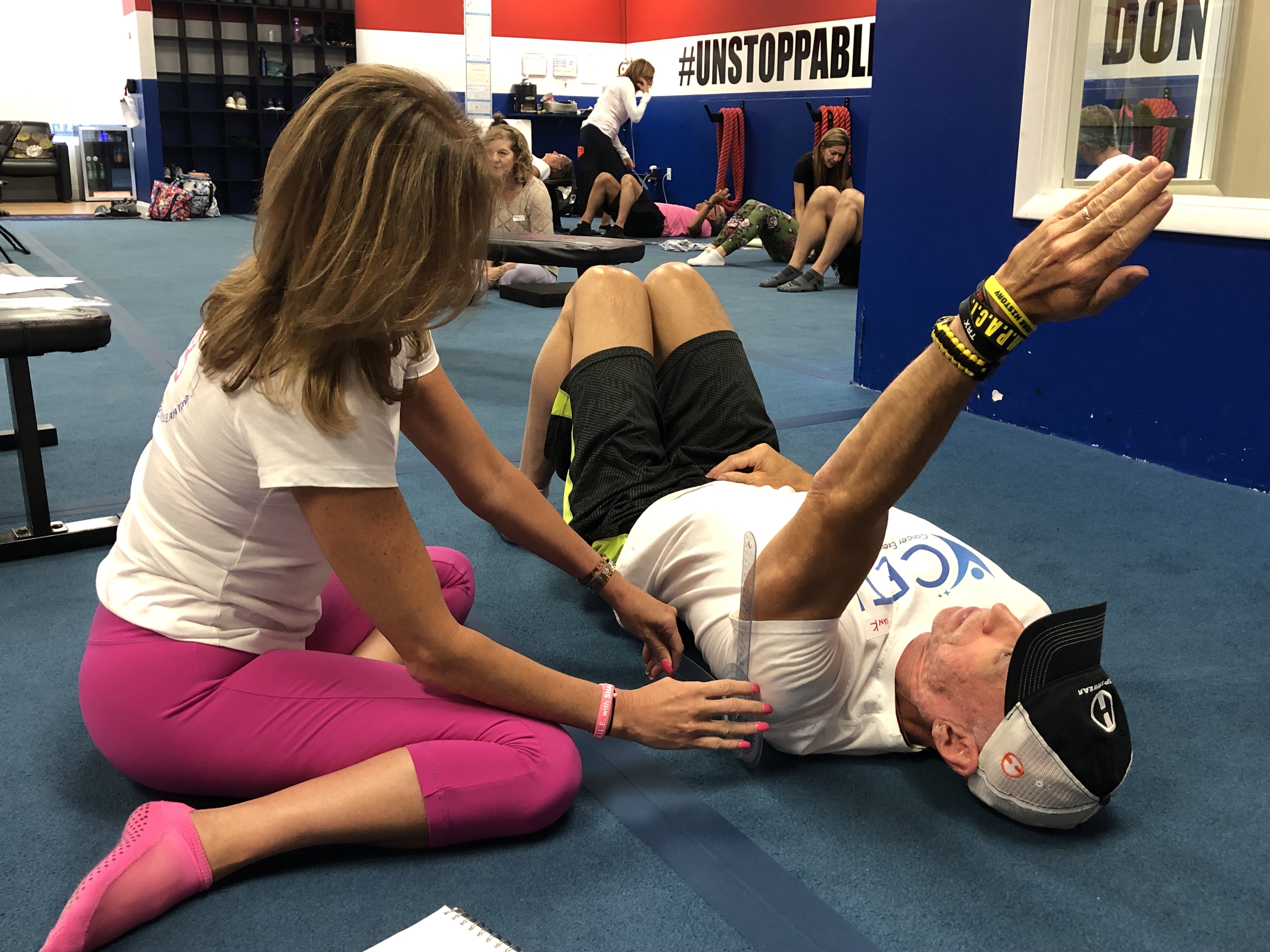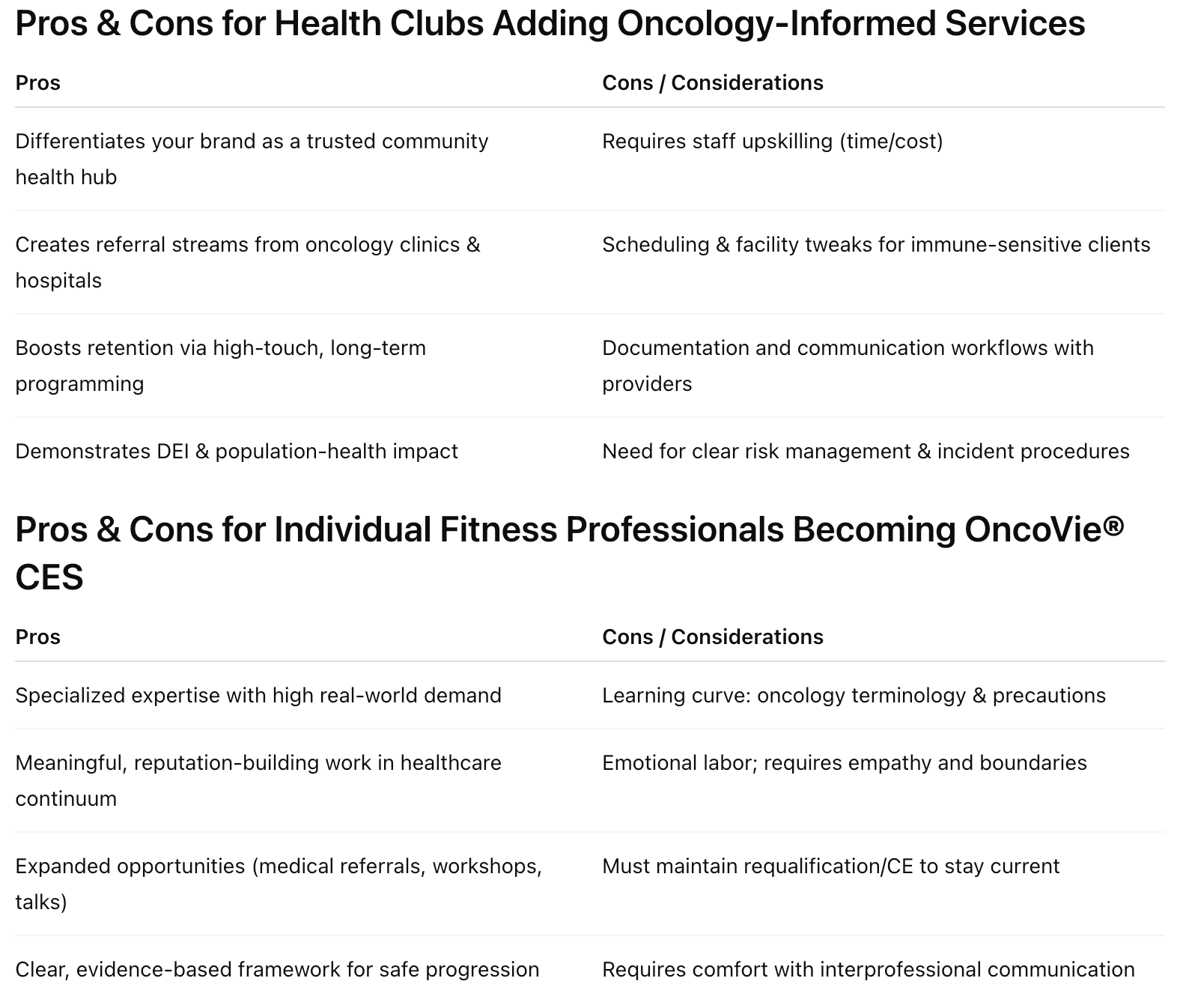
How Health Clubs Can Change Lives, Grow Revenue, and Lead the Future of Fitness
Aug 11, 2025Cancer Survivors Are Already in Your Club
Cancer isn’t a niche. It’s a population you already serve - often invisibly. As of May 2025, an estimated 18.6 million people are living with and beyond cancer in the U.S. alone, a number projected to rise sharply over the next 15 years. Yet 36-37% of survivors report no leisure-time physical activity, and fewer than 1 in 6 meet both aerobic and strength guidelines. That’s an urgent health gap - and a business opportunity - for clubs, studios, hospital-based fitness programs, and community centers worldwide.
OncoVie® Cancer Exercise Specialists (CES) are uniquely trained to translate complex cancer histories, treatments, surgeries, side effects, and reconstruction into safe, individualized programming that improves function, decreases symptoms, and supports long-term survivorship. When a health club integrates OncoVie-qualified professionals and cancer-informed systems, it doesn’t just add a service line, it steps into the healthcare continuum as the next necessary handoff after oncology care.
CETI’s training is approved for CEU's from organizations such as ACE, AAHF, AFAA, Australia Fitness (through ACE), Canfitpro, CIMSPA, Functional Aging Institute, ISSA, NASM, NSCA, and NFPT.
What the Industry Already Says
NASM profiled the need plainly: most fitness professionals will encounter clients affected by cancer and must understand this higher-risk group. As Andrea Leonard told NASM:
“This is a much higher-risk group than the average person,” requiring complete understanding of acute and chronic side effects and cancer-specific programming.⁴
The NASM Working Through Cancer feature emphasized that exercise oncology expertise isn’t optional, it’s essential for safety, outcomes, and professional credibility.
ACE formalized the bridge: The ACE Cancer Exercise Specialist program - authored by Andrea Leonard and provided by the Cancer Exercise Training Institute (CETI) - explicitly positions the role as a way to:
“Bridge the gap between medicine and fitness,” guiding patients from treatment into recovery and long-term survivorship.
ACE’s partnership with CETI in 2017 brought oncology-specific training into one of the world’s largest fitness certification networks, making this education accessible worldwide.
NSCA spotlighted CETI’s depth of knowledge in its 10 Things You Must Know When Working With Cancer Patients & Survivors session at the NSCA Personal Training Virtual Conference. Andrea Leonard:
Thoroughly detailed the impact of various cancer surgeries on muscle balance, range of motion, and the program considerations necessary to restore functio - while preventing or managing lymphedema.
Rocky Mountain University of Health Professions partners with CETI to offer its Advanced Qualification course, calling it:
“The Holy Grail of cancer exercise education,” and Andrea “a leading cancer exercise specialist.”
This partnership underscores CETI’s academic rigor and its ability to prepare professionals for real-world clinical integration.
Functional Aging Institute (FAI) collaborates closely with CETI to address the intersection of aging and cancer recovery, equipping fitness professionals to serve the growing demographic of older survivors with complex health needs.
 “According to Alembika Magazine, Andrea is a ‘globally sought-after speaker on exercise oncology,’ and through CETI has trained nearly 20,000 professionals in 52 countries—that kind of reach doesn’t happen by accident.”
“According to Alembika Magazine, Andrea is a ‘globally sought-after speaker on exercise oncology,’ and through CETI has trained nearly 20,000 professionals in 52 countries—that kind of reach doesn’t happen by accident.”
Missed Opportunities for Health Clubs & Fitness Professionals
-
Retention & Lifetime Value
Survivors need long-term, adaptive programming - exactly what drives retention. Without oncology-informed services, members churn when treatment side effects, fatigue, neuropathy, or surgical limitations make “regular” classes feel unsafe or discouraging. (Data show inactivity is common and sitting time relates to worse outcomes among survivors.) -
Community & Reputation
Cancer-savvy offerings elevate your brand from “gym” to community health hub. They also open doors to hospital referrals, survivorship clinics, cancer centers, and oncology nurse navigators looking for trusted next-step providers. -
Diversity, Equity & Access
Cancer touches every demographic; culturally competent, oncology-informed programming reduces barriers and aligns with public-health missions and payer priorities. -
Staff Development & Safety
Without proper training, staff risk contraindicated exercise selections (e.g., unmanaged lymphedema risk, poorly timed intensity, unsafe loading post-reconstruction). Oncology-specific education prevents harm and builds staff confidence. NASM emphasizes that specialized education is essential before stepping into this population.
What Makes OncoVie® Training Different
CETI’s OncoVie® framework (also delivered through ACE as a Partner Specialist Program) emphasizes:
-
Individualization based on cancer type, stage, treatment, reconstruction, comorbidities, and current function.
-
Risk management: lymphedema prevention/management, surgical ROM restoration, neuropathy/osteoporosis-aware exercise selection, and immune-sensitive programming.
-
Assessment-led progressions (not templated workouts) to restore posture, mobility, strength, stamina, and confidence.
-
Medical collaboration: how to communicate with providers and align plans with oncology timelines and precautions.
As NASM’s feature on Andrea Leonard highlights, the goal is proficiency across acute and chronic side effects and the ability to program to prevent, minimize, and correct them - skills “not enough” without deeper oncology education.
Business Case: Simple First Steps for Clubs
-
Designate an Oncology Services Lead (OncoVie-qualified) to own protocols, referrals, and outcomes tracking.
-
Build a 12-week Survivorship Track: intake → oncology-aware assessment → progressive plan (ROM, core/balance, aerobic, strength) → discharge to small-group training.
-
Formalize referral pathways with local oncology practices, breast and surgery teams, and survivorship clinics; offer in-service education to navigators.
-
Market inclusivity: make your facilities feel safe for immunocompromised members, private training hours, sanitation practices, and staff badges indicating OncoVie competency.
-
Measure what matters (e.g., fatigue scales, ROM, sit-to-stand, 6-minute walk, patient-reported outcomes) and share de-identified results with referring partners.
Credible Voices, Clear Direction
-
NASM underscored the need for specialized education and quoted Andrea Leonard discussing the higher-risk nature of this population, reinforcing that cancer-informed competence isn’t optional if you intend to serve survivors safely.
-
ACE didn’t just endorse the concept; it partnered with CETI and entrusted Andrea Leonard to author the specialist curriculum specifically to bridge medicine and fitness, so exercisers don’t fall through the cracks after treatment.
If you run a club or lead a training team, the question isn’t whether you “have” cancer survivors in your membership, you already do. The question is whether you’ll keep losing them to inactivity, fear, and avoidable complications, or welcome them back with a skilled, safe, and compassionate path led by OncoVie® Cancer Exercise Specialists.

“Andrea has worked tirelessly for more than 20 years focused on this mission and is now one of the most respected professionals in cancer prevention and recovery through exercise.” - Fit-Pro / PFP “Journey to Success”
Rocky Mountain University of Health Professions (RMUoHP)
RMUoHP partnered with CETI to offer its Advanced Qualification course, citing Andrea’s leadership and influence across 27 types of cancer. They recognized her as “a leading cancer exercise specialist,” and described the course as “the Holy Grail of cancer exercise training.”
Distinguished Individuals & Testimonials
-
Dr. Jay Harness, a renowned breast surgical oncologist, praised the program as follows:
“The whole concept of taking health and fitness professionals and giving them additional training to become legitimate specialists in the care and treatment of cancer patients is a unique and valuable program. I’ve gone through the modules and they are outstanding. In my world of breast cancer, people with this level of cancer exercise training are really needed.”
-
Glenn B. Gero, N.D., a naturopathic doctor, shared:
“You have elevated the role of exercise and cancer survival to a level that nobody else has. Every doctor, trainer, physical and occupational therapist should be armed with this critical information.”
-
Marcia Jones, Special Programs Manager at Avera McKennan Hospital Fitness Center:
“I recommend the Cancer Exercise Training Institute for the OncoVie Cancer Exercise Specialist Advanced Qualification. The training is top‑notch”
-
Laurie Knutson, Director of Sanford Cancer Center Hematology & Oncology:
“You kept the workshop interesting and fun. The workbook was well‑written. We will shortly be unveiling a full‑fledged regional cancer wellness program at Sanford; your training helped us greatly.”
Cancer survivors are already in your classes, on your training floor, and in your membership database.
The question isn’t if you’ll work with them, it’s whether you’ll be ready to do it safely, effectively, and confidently.
Be the facility or professional who changes the game:
-
Protect your clients with medically-informed, oncology-specific programming.
-
Grow your business with a high-demand specialty that builds loyalty and referrals.
-
Lead your community by bridging the gap between fitness and healthcare.
The opportunity is here. The need is now.
Become an OncoVie® Cancer Exercise Specialist with CETI and set the standard for survivorship fitness in your area.
Start today at ceti.teachable.com - because no survivor should be left without a safe path back to strength.
References
-
Siegel RL, Miller KD, Wagle NS, Jemal A. Cancer statistics, 2025. CA Cancer J Clin. 2025;75(1):5-27.
-
Gómez-Bruton A, et al. Physical activity prevalence among US cancer survivors. Clin Transl Oncol. 2025;27(2):239-249.
-
Schmitz KH, et al. Exercise is medicine in oncology. CA Cancer J Clin. 2021;71(2):105-123.
-
NASM. Working Through Cancer: Exercise as a Part of Recovery. National Academy of Sports Medicine; 2020.
-
National Strength and Conditioning Association. The 10 Things You Must Know When Working With Cancer Patients & Survivors. NSCA; 2021.
-
American Council on Exercise. Cancer Exercise Specialist Program Overview. ACE; 2024.
-
Cancer Exercise Training Institute. Testimonials & Accreditations. CETI; 2025.
-
YMCA of the USA. LIVESTRONG at the YMCA: By the Numbers. YMCA; 2025.
Start your journey to becoming an OncoVie™ Cancer Exercise Specialist with our world-leading courses in oncology exercise.


